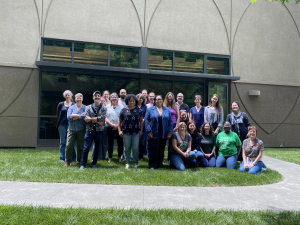How I Wrote My First Book

On Tuesday, October 30, 2018, historian Nicole Elizabeth Barnes joined the Faculty Write Program's First Book Faculty Writing Group to talk about her experience writing her first book, Intimate Communities: Wartime Healthcare and the Birth of Modern China 1937-1945 (University of CA Press, 2018).
Barnes’ first book started as a dissertation that undertook a revisionist history of wartime healthcare in China from the perspective of women’s & gender history in the 1930s and 1940s. Barnes’ approach in grad school was to envision the dissertation as book from day one. And, although the resultant text had to shelve some of the content from her dissertation to footnotes and her second book, she championed the relative liberty that she received from her committee members as central to the transition from dissertation to book. The process was not as rocky as it could have been, under the circumstances. In what follows, Barnes shares advice for anyone undertaking a first book:
General Advice:
- Don’t worry about being late to editor; this is why they have many projects and people in the pipeline. Initially, Barnes had talked to her CA Press editor six years before she produced the actual book, and he waited patiently throughout that time.
- The only deadlines that really matter are the signed contracts that have deadlines, copy edits, etc. Until then, soft deadlines are meant to guide the process and are flexible. Follow the timeline that will allow you to produce your best work.
- When you submit your work for editorial/reader reviews, remember that it doesn’t have to be perfect. It’s a draft. A capital “D” draft. In the draft, you can make a note and ask the readers for advice. This is common. Barnes had two conclusions and asked for advice on which one was better. In the end, she scrapped both and wrote a new one.
- While writing, program a break into the process—even a mini-vacation, if you can. This will stimulate your thoughts and motivate you. You may even enjoy the revisions process.
- Know yourself. What is the best time of day for you to write, your biggest distractions, and habits, etc.? Know what motivates you best. Barnes’ productivity “BC, or before child” would involve getting up at 6am and writing for 1-2 hours. She didn’t allow any email during this writing time and minimized other distractions. For Barnes, this was the perfect time. Give the gift to yourself of keeping a sacred writing space wherein you are not beholden to anyone but yourself.
- Don’t discount the power of atmosphere: make your favorite tea, light a candle, do whatever works. The only time that Barnes’ writing rituals failed was post-2016 election. Allow yourself some emotional time when you need it, and forgive yourself when you are dissatisfied/immobilized by the work of it and by all of the pain in the world.
- Logistics of deciding on an open access e-book: Barnes chose to make her work open access because of the ethics of mass access. As a historian of China, she wanted her work to be immediately available around the world, and did not want cost or limited distribution models to be a barrier. The other option (besides paperback + online publishing), was expensive--- $70 hard cover options with Cal Press. Luminos offsets the cost of selling books through funding from: subventions, university library subscriptions, and the fact that authors choose to forgo all royalties. To assuage concerns of academic traditionalists, University of California Press includes a contextual paragraph just inside the book stating that the open source publication did not supplant the regular peer review process.
- Funding and institutional support for production: Check the standard subvention amounts for your publisher to begin weighing the fund raising on your end. Barnes had 29 images in her book, and CA Press required $9,500 in subvention funds. Barnes received funds from the Trinity College Deans of Social Sciences and Humanities, the Asian/Pacific Studies Institute (APSI), and Duke University Center for International and Global Studies. Dean Gennifer Weisenfeld was very supportive of eBook publishing. Know that there are many campus entities that have discretionary money for production costs. All of these subventions supported a text that now has free download anywhere in the world.
- Wasted Labor (or, What Not to Do): Don’t write your own index. Hire an indexer (around $1500 is a standard fee, based on time needed for the job), or see if your research funds will cover it. Ask the press to suggest an indexer. Also do not stress over footnotes; your copyeditor will clean them up.
- Release the work: Release the work early and often! Barnes now works in a writing accountability group with short pieces each week, building communities of readers early in the stage, which makes the submission process less terrifying.
- Kick it out the door: Throughout her revision process Barnes kept a stickie note on her computer with the mantra “There are two types of books: perfect and completed.” You will never feel like your book is perfect, so you have to force yourself to call it done and kick it out the door. Don’t get stuck polishing your text with no outside input for months or years on end.
Resources:
- From Dissertation to Book by William Germono is an excellent and useful book. Germano writes from his experience as a University of California Press editor for many years.
- The Franklin Humanities Institute Manuscript Workshop: Duke University FHI offers this fellowship every year—usually with two or three recipients each year—and they pay for the editorial review of two outside readers, and sometimes a course release (depending on grant funding). Barnes participated in fall 2016, submitted her manuscript for revisions in summer 2017, and completed her final manuscript in spring 2018. Comments were invaluable and the pre-editorial collegiality was formative in reshaping the text, even in its later stages. This was a great resource. https://fhi.duke.edu/programs/faculty-book-manuscript-workshops
- National Center for Faculty Development and Diversity Faculty Success Program Bootcamp, led Kerry Ann Rockquemore: Barnes applied to and participated in this program. Duke University will subsidize a small cohort to run through the program’s 12-week boot camp to gain structure and tools that were immediately applicable to her book project. Proposals are one-page, and awarded faculty receive a subsidy for the $3000 tuition as well as access to weekly webinars on techniques for writing, scheduling, and self-care. Access to weekly resource newsletter and other materials is free and available to all Duke faculty since Duke is an institutional member in NCFDD. https://www.facultydiversity.org/
- Years of research on the writing process is available online. Pomodoro techniques, write every day versus waiting for large swaths of time. https://www.theguardian.com/books/2011/mar/26/authors-secrets-writing
- What I talk about when I talk about running by Haruki Murakami is an excellent book by an author who became a marathon runner in order to develop the discipline necessary to write. Try reading books about how other authors (Hemmingway, Faulkner, etc.) disciplined themselves. Writing is not a muse that arrives. Verlyn Klinkenborg’s Several Short Sentences about Writing is also a great resource.
Download Nicole Elizabeth Barnes’s *FREE* e-book here: Intimate Communities: Wartime Healthcare and the Birth of Modern China, 1937-1945




